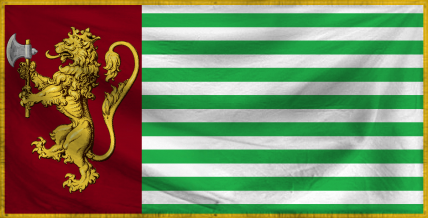Prologue
helga lydar,
store og småe
søner åt Heimdall.
Det vil du, Valfader,
at vel eg fortel
frå fyrndeheim
det som fyrst eg minnest.
Makarelv, Kostroma len, Realm of Cotland
16:30, Friday, 27 March 2020
It was a beautiful Friday afternoon in Makarelv, a small city of 26,000 inhabitants situated on the western bank of the Unzja river. The temperature was creeping above freezing, the sun was slowly setting, and the snow was finally slowly melting away, heralding the long awaited arrival of spring and the start of the warm season.
All around the city, the working week was gradually coming to an end and giving way to the joys of weekend. Families were gathering to break the fast with the family supper, and the younger generation was preparing for a night out on the town. The more devout of Makarelv’s inhabitants were making their way to the town hov, or temple, where they would make their offerings and prayers to the Gods and Godesses of their faith. Like almost 80% of the Cottish population, some 72% of Makarelv’s populace adhered to the Åsatru, or norse paganism, explaining the prominent location of the temple centrally in the small city, conveniently located by a livestock pen, and could accommodate two thousand worshipers at the time.
Welcoming the worshipers to the temple were the goði, or priests, who guided the faithful and accepted their offerings to the deities. Mostly, the offerings were chickens or other smaller creatures, purchased locally in the neighboring livestock pen, but occasionally, when someone had a serious request or some grevious sins to atone for, they would bring a significantly larger offering such as a bull or horse.
Today, one such worshiper had shown up, trying to atone for cheating on his wife with his secretary and his maid by offering a bullock up to seek the help from the Gods, more specifically the goddess of love Frøya, to get his wife to forgive him and take him back. As you could expect, trying to wrestle a frightened bullock into the hov was a noisy, distracting thing that required not only the repenting sinner but also two goði and another couple of worshipers to get the beast into the large, incense-laden wooden structure.
As this took place, Valdemar Holm helped guide his two young children, nine year old Ellen and six year old Sebastian, past the debacle towards the depiction of Balder, who was the kindest and most beautiful of the gods, where they would make their offering and pray for a good spring and year to come. Valdemar was thirty-one years old, working as an industrial mechanic in the cornerstone Soldemalt furniture factory, and had been bringing his children to the temple since they were born. His wife Karen wasn’t as devout as Valdemar was, and so had opted to stay at home and prepare supper while Valdemar took the children to temple.
After getting past the scene at the entryway, bullock and all, the small Holm family made it to the large idol, a four meter tall marble statue of Balder, just as an elderly man finished his prayers. Standing up from the kneeling position he had prayed in, the man noticed the small family and smiled kindly as he yielded his place before the idol to them. Thanking him with a kind nod and a smile, Valdemar held one child in each hand as they approached the idol and nodded in deference to the god embodied before them. With a kind word of encouragement from her father, Ellen held out the day’s offering to the goði – a live chicken purchased just outside the temple.
The goði accepted the offering, and as the young family kneeled before the idol, the goði took out a vicious-looking knife and adeptly decapitated the chicken before the idol. Chicken blood splattered over the idol, before the goði turned and splattered the chicken’s blood over the kneeling family’s hands as they held out their hands and said their prayers. As the prayers were finished, the worshipers took their bloody hands up to their faces and dragged them across their face, spreading the blood across their cheeks. Satisfied that their offering had pleased Balder, the small family got back up on their feet and accepted the slain and bloodless chicken carcass from the goði before moving on to the next post: the central fireplace.
Here, the family laid their offering on the sacrificial altar, where another goði accepted their offering and blessed them before taking the carcass and throwing it in the appropriate basket. The offerings were later skinned and gutted, and what was edible was cooked and provided to the city’s hospitals, orphanages and other charitable organizations for feeding the poor. It was one of many ways the temple and worshipers gave back to the community.
The bullock had been maneuvered out of the way and into Frøyas alcove, as could be heard by the distressed sounds of the poor animal, allowing Valdemar and his offspring to make their way to the exit, where large washing basins and soap waited for the devout to wash off the sacrificial blood before returning into the world outside the temple gates.
Just as Valdemar reached down to help Sebastian wash the last of the blood off his hands, a massive flash of orange and brown shocked the young family’s visual cortex before everything turned black as a massive explosion ripped through the temple.






